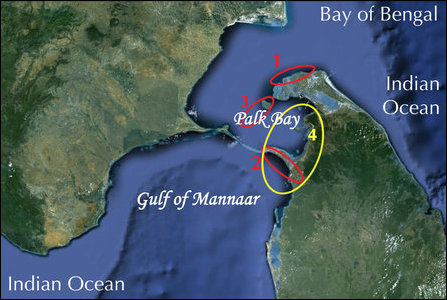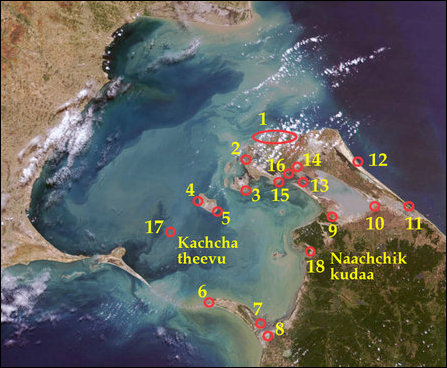Uprooted fishermen vow to continue their fight for Pa'l'li-munai in Mannaar
The uprooted Eezham Tamil fishermen from the coastal village of Pa'l'li-munai, located within the urban limits of Mannaar city, have reiterated that they are not prepared to succumb to the designs of the occupying Sri lankan Navy, which wants them to give up their demand of resettlement in their own village. The Sri lankan Navy is stationed in the private lands belonging to 23 families since 2000. It has also occupied their fish-market.
The Tamil people were uprooted for the first time in November 1990, when the Sri lankan Army occupied their settlement. Sri lankan Navy is stationed there since the year 2000. After 2009, and more recently since January 2016, the Sri lankan Navy has been fortifying its naval installations along the Mannaar coast, which is commanding both the Palk Bay and the Gulf of Mannaar as well as commanding the closest communication line with the Tamil Nadu coast.
The Tamil people were uprooted for the first time in November 1990, when the Sri lankan Army occupied their settlement. Sri lankan Navy is stationed there since the year 2000. After 2009, and more recently since January 2016, the Sri lankan Navy has been fortifying its naval installations along the Mannaar coast, which is commanding both the Palk Bay and the Gulf of Mannaar as well as commanding the closest communication line with the Tamil Nadu coast.
The Sri lankan Navy is now trying to buy the people off to abandon their demand through the promise of millions of rupees as compensation for their lands.
The uprooted people, who have been demanding resettlement in their own village since 2009, filed legal suits against the continued illegal seizure of their lands and the fish market. 19 of 23 villagers had managed to document their ownership in time before the lawsuit.
Unable to justify its continued occupation of the private lands at the court hearings, the lawyers representing the Sri lankan Navy were attempting to deceive the landowners with promises of ‘crores of rupees’ in August 2016.
The uprooted families were not prepared to be deceived with false promises.
Mannaar District Court Judge A. G. Alex Raja, who has been investigating the cases, has almost given an ultimatum to the Sri lankan Navy to come with a concrete suggestion in the last hearing held on 17 July, 2017.
The lawyers representing the Sri lankan Navy seem to have failed to convince the Judge on the continued occupation of private lands at Pa'l'li-munai.
The Sri lankan Navy was arguing that there was a strategic radar installation at the locality and that the naval detachment at Pa'l'li-munai was critical to defend the sovereignty of ‘Sri Lanka’.

While the territory under red circles mark the Sinhala military consolidation under Mahinda Rajapaksa seen as ‘pro China’, the coast under yellow circle mark the expansion of the consolidation started by Rajapaksa and continued by Ranil-Maithiri regime viewed as ‘pro USA’. New Delhi continues to have military-to-military relations with genocidal Sinhala military. The ultimate target is land and waters of Tamils in the Indian-Ocean. The places mentioned in the feature come under the yellow circle.
They Sri lankan Navy was also arguing that the installation was important to counter ‘international terrorism’ and to control smuggling of narcotics.
Finally, the Sri lankan Navy was claiming that the fishermen, if it withdrew from Pa'l'li-munai, would commence illegal means of fishing. The fishermen said there were other mechanisms to control illegal fishing. It was the Sri lankan Navy, which was bringing intruding Sinhala fishermen from South into the territorial and Historical waters of Eezham Tamils, the fishermen said.
The judge questioned the Sri lankan Navy whether it was prepared to give at least 2 million rupees per family as compensation in addition to providing the landowners with alternate lands. The Sri lankan Navy had no concrete response to the query at the courts. The Divisional Secretary should be present in the next hearing, which is scheduled for September 19, the Judge has instructed. Most importantly, the uprooted people should find the offer acceptable, the judge has stated.

Sri Lanka's large military establishments that choke Jaffna peninsula and threaten Indian security. Sinhala colonisation is carried out in places no 11, 13, 14, and 16.
The locations:
1. High Security Zone, Valikaamam North,
2. Kaarainakar naval base,
3. Vallan, Pungkudutheevu,
4. Periyathu'rai and Saamiththoadda-munai, Delft
(Key location for Kachchatheevu and Rameswaram),
5. Kunthavadi, Delft,
6. Thalai-mannaar,
7. Mannaar Fort,
8. Tha'l'laadi,
9. Poonakari Fort,
10. Elephant Pass,
11. Vettilaikkea'ni,
12. Naakarkoayil,
13. Ariyaalai East and the opposite sandbar Ma'n'niththalai,
14. Naavatkuzhi,
15. Ma'ndaitheevu,
16. Jaffna city,
17. Kachcha-theevu and
18. Naachchik-kudaa.
The innumerable small military posts and the newly planned cantonments in Vanni are not shown in the map.
The locations:
1. High Security Zone, Valikaamam North,
2. Kaarainakar naval base,
3. Vallan, Pungkudutheevu,
4. Periyathu'rai and Saamiththoadda-munai, Delft
(Key location for Kachchatheevu and Rameswaram),
5. Kunthavadi, Delft,
6. Thalai-mannaar,
7. Mannaar Fort,
8. Tha'l'laadi,
9. Poonakari Fort,
10. Elephant Pass,
11. Vettilaikkea'ni,
12. Naakarkoayil,
13. Ariyaalai East and the opposite sandbar Ma'n'niththalai,
14. Naavatkuzhi,
15. Ma'ndaitheevu,
16. Jaffna city,
17. Kachcha-theevu and
18. Naachchik-kudaa.
The innumerable small military posts and the newly planned cantonments in Vanni are not shown in the map.
The lawyers representing the landowners said the people have suffered immensely in the past due to their displacement and lack of alternative solutions. The uprooted people are firm in their stand of demanding their lands back.
If the Judge finds it necessary to allow the Sri lankan Navy to have its radar, it could continue to have the equipment with a small installation at the fish-market site, a section of the families said. But, none of them were prepared to relocate from the locality.
The plots of lands owned the people range from 6 perches to 20 perches per family. All the 23 families have documents to verify their ownership. Only 19 families filed the cases, as the remaining 4 were unable to secure their documents within time when the cases were filed, the lawyers said.
In the meantime, the Sri lankan wildlife department has silently seized large tracts of coastal lands through Gazette notifications issued in March 2016.
The seizure also includes four of the eight key jetties used by the Tamil-speaking fishermen in Mannaar, including the lands belonging to Pa'l'li-munai jetty.
The seizure has blocked the renovation of Pa'l'li-munai jetty, which is used by around 600 fishermen on a daily basis.
The continued occupation of lands and the subsequent refusal to renovate the jetties have caused anger among the Tamil and Muslim fishermen in Mannaar.



